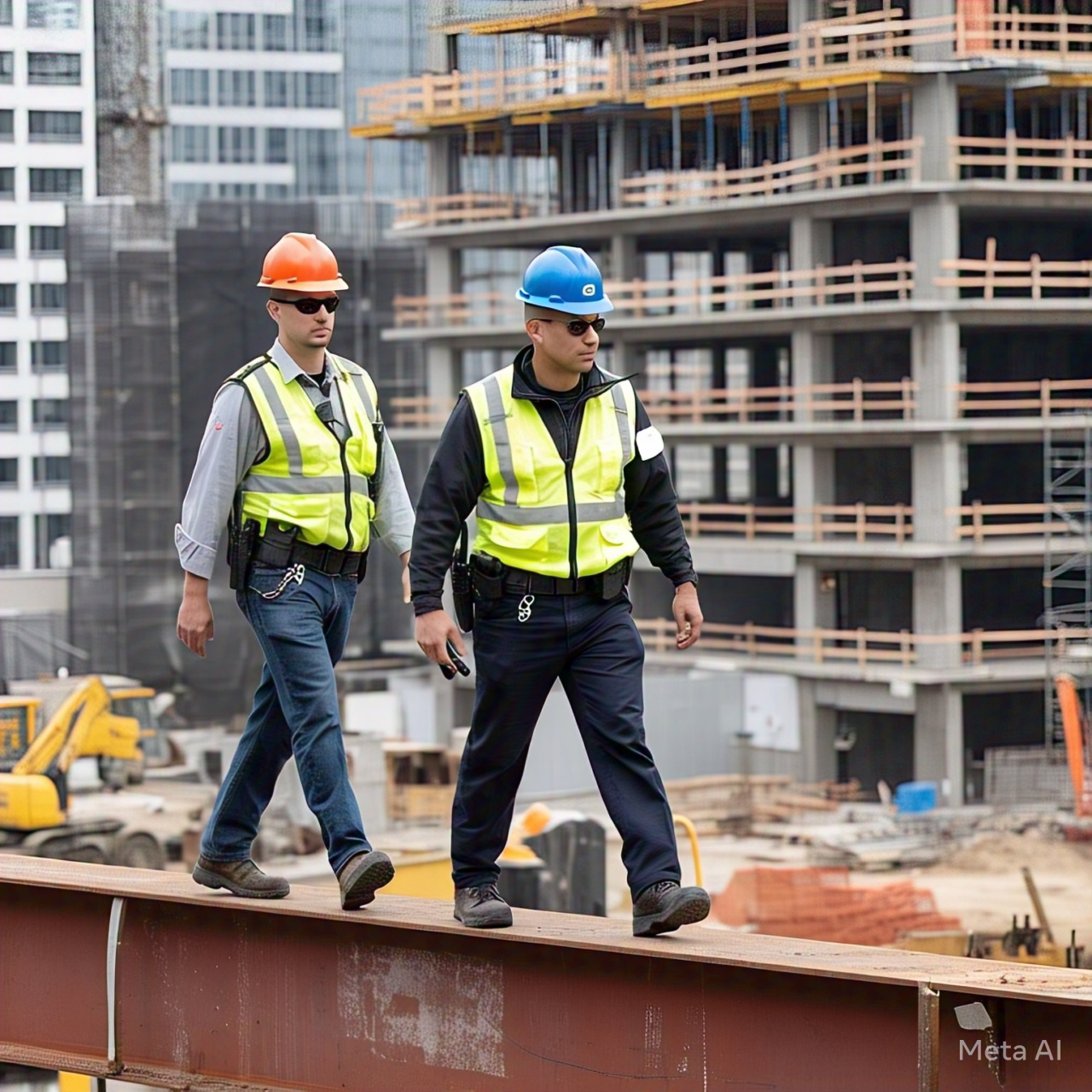The Growing Importance of Security at Construction Sites
In recent years, the importance of security at construction sites has dramatically increased. With expensive equipment, high-value materials, and multiple personnel working daily, the potential for theft, vandalism, and accidents has risen. Construction companies are now investing heavily in protective measures, making security guards a necessary component. These professionals not only deter criminal activity but also help enforce site safety regulations. Their presence promotes a secure working environment and ensures projects progress without disruptions. As construction sites grow in complexity and value, the role of security guards becomes ever more crucial in protecting assets and lives.
Understanding the Role of Security Guards on Site
Security guards at construction sites serve as the first line of defense. Their responsibilities go beyond simply watching over the area; they actively monitor entry points, verify identities, conduct regular patrols, and ensure safety protocols are followed. Guards are also trained to respond swiftly to emergencies such as fire outbreaks or unauthorized access. They work closely with site managers and construction teams to understand the layout, identify vulnerable spots, and implement effective security strategies. Their constant vigilance helps prevent delays caused by theft or injury and ensures the construction process remains on schedule.
Preventing Theft and Vandalism Through On-Site Security
Construction sites often attract criminal activity due to the presence of high-value machinery, materials, and tools. Without proper security, these items become easy targets for theft and vandalism, leading to financial losses and project delays. Security guards provide a visible deterrent to potential intruders. Their routine patrols and surveillance tactics ensure that suspicious activity is identified and dealt with promptly. In addition, trained personnel can apprehend trespassers and notify authorities swiftly, minimizing any potential damage. The mere presence of uniformed guards significantly reduces the chances of criminal interference.
Controlling Access to the Construction Zone
Unauthorized entry into construction sites can pose serious safety and security threats. Security guards are responsible for monitoring all access points, including gates and temporary entrances. They maintain visitor logs, check identification, and verify credentials of everyone entering the premises. This controlled access system ensures only authorized personnel are allowed in, thus reducing risks associated with intrusions, accidents, or theft. A well-regulated entry and exit procedure also aids in emergency response by providing an accurate count of individuals on-site at any given time.
Enhancing Worker Safety and Emergency Response
While the primary role of security guards is to prevent unauthorized access, they also play a pivotal role in worker safety. Guards are trained in emergency response procedures such as first aid, fire evacuation, and conflict resolution. In the event of an accident or hazardous situation, security personnel can take immediate action, potentially saving lives. Their presence also reinforces adherence to safety protocols by holding workers accountable and ensuring they use protective gear and follow standard operating procedures. This proactive approach greatly reduces workplace injuries.
Supporting Compliance with Occupational Health and Safety Regulations
Construction companies must comply with various health and safety regulations. Security guards help enforce these rules by identifying non-compliance and reporting it to supervisors. Whether it’s ensuring that workers wear hard hats or that machinery is operated safely, security personnel contribute to a safer work environment. Their constant monitoring can prevent legal issues that arise from negligence or accidents. By working alongside safety officers, guards create a culture of responsibility and awareness on-site, ultimately fostering a safer and more productive workspace.
Providing Round-the-Clock Surveillance
Construction sites often remain vulnerable outside working hours. With valuable equipment left overnight, the risk of unauthorized access increases. Having security guards stationed on-site 24/7 ensures continuous monitoring and protection. They can operate surveillance equipment, conduct nighttime patrols, and act as a deterrent to any potential criminal activity. This round-the-clock security presence significantly reduces risks during off-hours. Many construction companies now rely on professional services like comprehensive security solutions from trusted providers to maintain this level of protection across all phases of a project.
Customized Security Solutions for Site-Specific Risks
Each construction site has unique risks depending on its location, size, and stage of development. Professional security services assess these factors to develop a tailored plan. For example, urban sites may face more vandalism, while remote locations might struggle with equipment theft. Security providers customize guard schedules, surveillance placement, and emergency protocols based on specific site needs. This flexibility ensures that resources are allocated effectively and security risks are minimized.
Technology Integration with Security Personnel
Modern construction site security often involves a combination of human presence and technology. Security guards now use advanced tools such as motion detectors, CCTV cameras, drones, and biometric scanners to enhance their efficiency. These systems allow for better monitoring, quicker response times, and data recording for investigations. Guards trained in operating such equipment provide an added layer of intelligence-driven security. This combination of manpower and tech solutions offers a well-rounded approach to construction site protection.
Cost-Benefit Analysis of Hiring Security Guards
Some construction managers hesitate to hire full-time security guards due to cost concerns. However, the long-term benefits far outweigh the initial investment. The cost of stolen equipment, construction delays, or legal action due to safety violations can be significantly higher. By preventing these issues, security guards save money in the long run. Moreover, insurers may offer reduced premiums for sites with active security measures. When viewed as a protective investment, security personnel prove to be a highly valuable asset for any construction project.
Boosting Morale and Productivity on Site
A secure working environment positively affects worker morale and productivity. Knowing that their safety is being looked after allows workers to focus on their tasks without fear. Security guards also act as mediators in case of disputes, helping maintain a professional atmosphere. Their involvement in day-to-day operations instills a sense of discipline and order, which contributes to smoother project execution. When workers feel safe and supported, efficiency increases, and job satisfaction improves.
The Role of Security Patrols in Large Construction Projects
Larger construction sites often span multiple acres, making them harder to monitor. Security guards perform regular patrols to cover these expansive areas, checking for signs of intrusion, hazards, or equipment malfunction. These patrols are scheduled at intervals to ensure no part of the site is left unattended for long. Mobile patrol units can also respond quickly to any reported incidents, maintaining site integrity. A visible patrolling presence not only enhances security but also reassures workers and stakeholders alike.
Managing Safety in High-Risk Construction Environments
Some construction sites pose higher risks due to their location or the nature of work involved—such as bridges, tunnels, or skyscrapers. These sites require specialized security services trained to handle complex environments. Guards must be equipped to manage potential dangers, from height-related accidents to restricted-area breaches. Security services like construction site protection in Melbourne cater specifically to these high-risk areas with trained personnel and advanced equipment, ensuring every safety aspect is addressed thoroughly.
Partnering with Reputable Security Companies
To fully benefit from on-site protection, it’s important to collaborate with a reputable security provider. Experienced firms understand the nuances of construction security and offer trained, licensed personnel who can adapt to dynamic environments. They also conduct risk assessments, create site-specific security plans, and provide ongoing support throughout the project lifecycle. Choosing a trusted partner not only enhances safety but also demonstrates a commitment to professionalism and accountability.
Why Every Construction Site Needs Security Guards
Construction site safety is not optional—it’s a necessity. Security guards play a critical role in maintaining order, protecting assets, and ensuring that operations run smoothly. From deterring theft to handling emergencies, their presence is indispensable. Investing in professional security services ensures peace of mind for construction managers, workers, and clients alike. As risks grow, the value of having trained guards on-site becomes increasingly clear. They are not just watchers—they are proactive protectors of people, property, and progress.
FAQs
1. What is the main purpose of a construction site security guard?
To prevent theft, vandalism, and ensure the safety of workers and equipment.
2. Do construction security guards work at night?
Yes, many sites employ guards 24/7 to protect against nighttime intrusions.
3. Can guards help in emergency situations on-site?
Absolutely. They’re trained in first aid, fire response, and emergency evacuation.
4. Are security guards necessary for small construction projects?
Yes, even small sites face risks. Security helps deter theft and ensures compliance with safety rules.
5. How do guards verify who enters the site?
They use ID checks, visitor logs, and sometimes biometric systems to manage site access.
6. Does hiring a security service reduce insurance costs?
In many cases, yes—insurance companies may offer lower premiums for secured sites.

